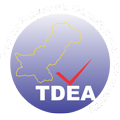ISLAMABAD, July 29, 2020: Experts at a virtual conference on ensuring peaceful and tolerant campuses in Pakistan suggested adopting a top-down approach instead of only focusing on students.
The speakers pointed out that intolerance was tackled incorrectly, especially in Pakistan, and said that the university management and faculties should themselves display tolerance to reinforce positive behavior among students.
The Trust for Democratic Education and Accountability (TDEA) organized the conference—how can we ensure peaceful and tolerant campuses across Pakistan—in collaboration with the Council of Islamic Ideology (CII) and with support from the European Union Delegation to Pakistan under its project Advocacy and Legal Aid for Religious Minorities (ALARM).
Dr. Zulfiqar Gillani, a policy advisor at the Higher Education Commission (HEC), said that tolerance and intolerance were practices always in a continuum, and such behaviours existed in every human. However, to tackle the situation, it was crucial to analyze multiple factors that allowed intolerance to persist.
“A peaceful campus is one where the university management, faculty, and students are in constant mental synergy with each other, respect each other’s opinions, and accept them as well,” Dr. Qibla Ayaz, the head of CII, who chaired the conference, said. “Contrary to the present trend, whatever opinions people have in that premise must not be enforced on others since that results in indoctrinated minds, rather than creative, progressive minds.”
The conference had 39 participants, including ten females, including academicians, students, civil society representatives, and international donor organizations.
Ms. Anne Marchal, Chargé d’affaires a.i. European Union delegation to Pakistan, said in her keynote address that the EU believed that education was the key to uniting nations and reforming societies into progressive and inclusive ones. “University campuses being centers of ideas, innovation and knowledge-creation, can play a vital role in inculcating the values of responsible citizenship, peace, tolerance, harmony, pluralism and co-existence among the youth and the future leaders of any given society.”
She said that the EU was pleased to engage with key stakeholders on the theme of peaceful and tolerant university campuses, preparing students to values of responsible citizenships and reminding them of EU scholarship opportunities through Erasmus+ for Pakistanis. It is a vital area for EU-Pakistan strategic cooperation launched one year ago.
Dr. Afia Zia, a leading academic and writer, highlighted another misconception often attached to student unions that they were violent or revolutionists. This had resulted in the stigmatization of student unions, and the youth of the country being disassociated from the political sphere. She thought that teachers needed to start believing in students’ intellectual capacity to reach conclusions themselves, rather than forcing conclusions on them.
Other speakers agreed that syllabus revision from primary to higher education level would also be a great initiative since the current curricula did not have adequate creative thinking.
Jamshed Iqbal, a peace-builder, trainer, and writer, moderated the session, which also had Dr. Fakhr-Ul-Islam and Dr. Aamer Raza, both from the University of Peshawar.
To download the press release, click here

















